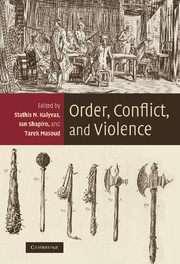Book contents
- Frontmatter
- Contents
- List of figures
- List of tables
- List of contributors
- Preface
- 1 Introduction: integrating the study of order, conflict, and violence
- Part 1 Creating, maintaining, and restoring order
- Part 2 Challenging, transforming, and destroying order
- 8 Civil wars and guerrilla warfare in the contemporary world: toward a joint theory of motivations and opportunities
- 9 Clausewitz vindicated? Economics and politics in the Colombian war
- 10 Articulating the geo-cultural logic of nationalist insurgency
- 11 Which group identities lead to most violence? Evidence from India
- 12 Order in disorder: a micro-comparative study of genocidal dynamics in Rwanda
- 13 Sexual violence during war: toward an understanding of variation
- 14 “Military necessity” and the laws of war in Imperial Germany
- 15 Preconditions of international normative change: implications for order and violence
- 16 Promises and pitfalls of an emerging research program: the microdynamics of civil war
- Index
- References
16 - Promises and pitfalls of an emerging research program: the microdynamics of civil war
Published online by Cambridge University Press: 06 July 2010
- Frontmatter
- Contents
- List of figures
- List of tables
- List of contributors
- Preface
- 1 Introduction: integrating the study of order, conflict, and violence
- Part 1 Creating, maintaining, and restoring order
- Part 2 Challenging, transforming, and destroying order
- 8 Civil wars and guerrilla warfare in the contemporary world: toward a joint theory of motivations and opportunities
- 9 Clausewitz vindicated? Economics and politics in the Colombian war
- 10 Articulating the geo-cultural logic of nationalist insurgency
- 11 Which group identities lead to most violence? Evidence from India
- 12 Order in disorder: a micro-comparative study of genocidal dynamics in Rwanda
- 13 Sexual violence during war: toward an understanding of variation
- 14 “Military necessity” and the laws of war in Imperial Germany
- 15 Preconditions of international normative change: implications for order and violence
- 16 Promises and pitfalls of an emerging research program: the microdynamics of civil war
- Index
- References
Summary
The study of civil war ranks among the most notable developments in political science during the last decade. Several important papers have been published in this period and the field has witnessed an important shift toward cross-national, large-N econometric studies (e.g. Collier and Hoeffler 2004; Fearon and Laitin 2003), following a previous shift from the case-study format to that of theoretically informed studies (Wickham-Crowley 1992; Skocpol 1979; Scott 1976; Eckstein 1965).
However, despite these advances much remains to be understood. On the one hand, the conceptual foundations of our understanding of civil wars are still weak (Kalyvas 2001; 2003; Cramer 2002); on the other hand, econometric studies have produced very little in terms of robust results – the main one being that, like autocratic regimes (Przeworski et al. 2000), civil wars are more likely to occur in poor countries. The problems of econometric studies are well known: their main findings are incredibly sensitive to coding and measurement procedures (Hegre and Sambanis 2006; Montalvo and Reynal-Querol 2005; Sambanis 2004b); they entail a considerable distance between theoretical constructs and proxies (Cederman and Girardin 2007; Fearon et al. 2007) as well as multiple observationally equivalent pathways (Kalyvas 2007; Humphreys 2005; Kocher 2004; Sambanis 2004a); they suffer from endogeneity (Miguel et al. 2004); they lack clear microfoundations or are based on erroneous ones (Cramer 2007; Kalyvas and Kocher 2007b; Gutiérrez Sanín 2004); and, finally, they are subject to narrow (and untheorized) scope conditions (Wimmer and Min 2006).
- Type
- Chapter
- Information
- Order, Conflict, and Violence , pp. 397 - 421Publisher: Cambridge University PressPrint publication year: 2008
References
- 61
- Cited by



